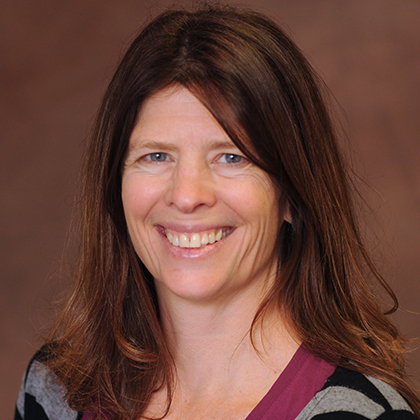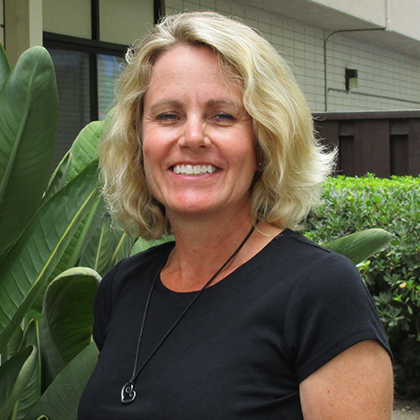Planning a Hybrid Course for Alternative Clinical Education in Communication Sciences and Disorders
Professional Bio: Lisa Lasalle and Julie Shuler
 Dr. Lisa Lasalle received her B.S. in Speech- Language Pathology from Mary Washington College (1986) MSEd in Speech- Language Pathology from the University of Virginia (1988) and PhD in Communication Sciences and Disorders from Syracuse University (1993). Dr. Lasalle's research focuses on stuttering and other speech fluency disorders; phonetics; speech science and research methods. Dr. Lisa LaSalle is an ASHA-certified speech-language pathologist with specialty training in stuttering and fluency disorders. Dr. LaSalle has taught in graduate programs in Communication Sciences and Disorders for twenty years. Her research interests have focused on young children who stutter, concomitant disorders associated with stuttering and a fluency disorder known as cluttering. Dr. LaSalle is currently mentoring University of Redlands Communicative Disorders students on a research project aimed at dissociations between language, phonology, and fluency among normally fluent two-to-four-year-olds.
Dr. Lisa Lasalle received her B.S. in Speech- Language Pathology from Mary Washington College (1986) MSEd in Speech- Language Pathology from the University of Virginia (1988) and PhD in Communication Sciences and Disorders from Syracuse University (1993). Dr. Lasalle's research focuses on stuttering and other speech fluency disorders; phonetics; speech science and research methods. Dr. Lisa LaSalle is an ASHA-certified speech-language pathologist with specialty training in stuttering and fluency disorders. Dr. LaSalle has taught in graduate programs in Communication Sciences and Disorders for twenty years. Her research interests have focused on young children who stutter, concomitant disorders associated with stuttering and a fluency disorder known as cluttering. Dr. LaSalle is currently mentoring University of Redlands Communicative Disorders students on a research project aimed at dissociations between language, phonology, and fluency among normally fluent two-to-four-year-olds.
 Dr. Julie Shuler received a B.A. Communicative Disorders from University of Redlands, M.S. in Speech and Hearing Sciences from University of Washington and American Speech and Hearing Association Certification California State License. Julie joined the Department of Communicative Disorders in 1994. She is currently the clinic director for the Truesdail Center for Communicative Disorders. Areas of interest include adult neurogenics, voice disorders, adult and pediatric traumatic brain injury and AAC. Primary responsibilities for the department include clinical teaching in the area of assessment and intervention. Interests are in the area of student learning styles and measuring clinical competence. Julie has studied the type of learners attracted to the field of Speech and Language Pathology. Current research is addressing pedagogical considerations for teaching and measuring clinical competence.
Dr. Julie Shuler received a B.A. Communicative Disorders from University of Redlands, M.S. in Speech and Hearing Sciences from University of Washington and American Speech and Hearing Association Certification California State License. Julie joined the Department of Communicative Disorders in 1994. She is currently the clinic director for the Truesdail Center for Communicative Disorders. Areas of interest include adult neurogenics, voice disorders, adult and pediatric traumatic brain injury and AAC. Primary responsibilities for the department include clinical teaching in the area of assessment and intervention. Interests are in the area of student learning styles and measuring clinical competence. Julie has studied the type of learners attracted to the field of Speech and Language Pathology. Current research is addressing pedagogical considerations for teaching and measuring clinical competence.
Project Summary:
The general aim of this project was to implement technology to help solve problems in our Communication Sciences and Disorders graduate program with the following: (a) Some graduate students prefer medical placement over school placements or vice versa, and there is little room for them to specialize in our current curriculum; (b) Other graduate programs compete with ours to place their graduate students at a finite number of externship sites; and (c) Twenty-five percent (7/28) of our graduate students in 2016 did not enter into or successfully complete medical placements this past year for reasons of withdrawals or not meeting specific externship standards. This problem of not being able to successfully place graduate students into externships is recognized nationally by the accrediting association, American Speech-Language Hearing Association (ASHA), and a partial solution to this from ASHA is known as the “ACE” (Alternative Clinical Education) experience, which allows graduate students to earn clinical clock hours by working with simulated cases. Self-reflection and discussion of the learning associated with working with simulated cases is an important and recommended aspect of an ACE experience.

 Dr. Lisa Lasalle received her B.S. in Speech- Language Pathology from Mary Washington College (1986) MSEd in Speech- Language Pathology from the University of Virginia (1988) and PhD in Communication Sciences and Disorders from Syracuse University (1993). Dr. Lasalle's research focuses on stuttering and other speech fluency disorders; phonetics; speech science and research methods. Dr. Lisa LaSalle is an ASHA-certified speech-language pathologist with specialty training in stuttering and fluency disorders. Dr. LaSalle has taught in graduate programs in Communication Sciences and Disorders for twenty years. Her research interests have focused on young children who stutter, concomitant disorders associated with stuttering and a fluency disorder known as cluttering. Dr. LaSalle is currently mentoring University of Redlands Communicative Disorders students on a research project aimed at dissociations between language, phonology, and fluency among normally fluent two-to-four-year-olds.
Dr. Lisa Lasalle received her B.S. in Speech- Language Pathology from Mary Washington College (1986) MSEd in Speech- Language Pathology from the University of Virginia (1988) and PhD in Communication Sciences and Disorders from Syracuse University (1993). Dr. Lasalle's research focuses on stuttering and other speech fluency disorders; phonetics; speech science and research methods. Dr. Lisa LaSalle is an ASHA-certified speech-language pathologist with specialty training in stuttering and fluency disorders. Dr. LaSalle has taught in graduate programs in Communication Sciences and Disorders for twenty years. Her research interests have focused on young children who stutter, concomitant disorders associated with stuttering and a fluency disorder known as cluttering. Dr. LaSalle is currently mentoring University of Redlands Communicative Disorders students on a research project aimed at dissociations between language, phonology, and fluency among normally fluent two-to-four-year-olds. Dr. Julie Shuler received a B.A. Communicative Disorders from University of Redlands, M.S. in Speech and Hearing Sciences from University of Washington and American Speech and Hearing Association Certification California State License. Julie joined the Department of Communicative Disorders in 1994. She is currently the clinic director for the Truesdail Center for Communicative Disorders. Areas of interest include adult neurogenics, voice disorders, adult and pediatric traumatic brain injury and AAC. Primary responsibilities for the department include clinical teaching in the area of assessment and intervention. Interests are in the area of student learning styles and measuring clinical competence. Julie has studied the type of learners attracted to the field of Speech and Language Pathology. Current research is addressing pedagogical considerations for teaching and measuring clinical competence.
Dr. Julie Shuler received a B.A. Communicative Disorders from University of Redlands, M.S. in Speech and Hearing Sciences from University of Washington and American Speech and Hearing Association Certification California State License. Julie joined the Department of Communicative Disorders in 1994. She is currently the clinic director for the Truesdail Center for Communicative Disorders. Areas of interest include adult neurogenics, voice disorders, adult and pediatric traumatic brain injury and AAC. Primary responsibilities for the department include clinical teaching in the area of assessment and intervention. Interests are in the area of student learning styles and measuring clinical competence. Julie has studied the type of learners attracted to the field of Speech and Language Pathology. Current research is addressing pedagogical considerations for teaching and measuring clinical competence.